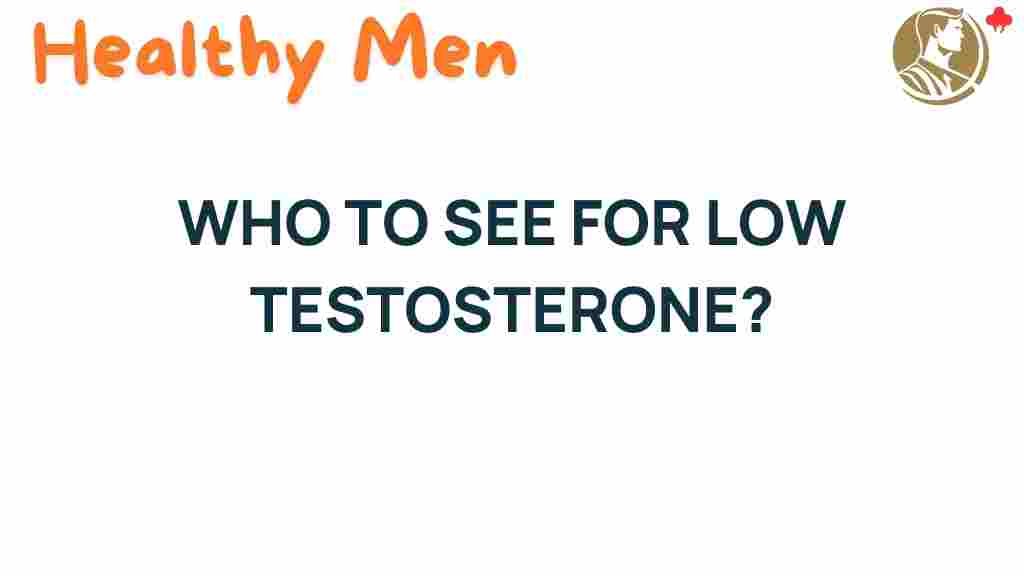Low testosterone, also known as hypogonadism, is a condition that affects many men as they age. This hormonal imbalance can lead to various health issues, impacting not only physical health but also emotional and mental well-being. Understanding the role of health professionals in diagnosing and treating low testosterone is crucial for effective management. In this article, we will explore the various experts you should consult, treatment options available, and how to navigate the journey towards better men’s health and wellness.
Understanding Low Testosterone
Low testosterone levels can result from various factors, including age, genetics, lifestyle choices, and underlying health conditions. Symptoms of low testosterone may include:
- Reduced libido or sexual desire
- Fatigue and decreased energy levels
- Loss of muscle mass
- Increased body fat
- Depression and mood changes
If you suspect that you might have low testosterone, it is essential to consult with a qualified health professional for accurate diagnosis and appropriate treatment.
Key Health Professionals to Consult for Low Testosterone
When dealing with low testosterone, several health professionals play a vital role in diagnosis and treatment. Here are the key experts you should consider consulting:
1. General Practitioner (GP)
Your first step in addressing low testosterone should typically be a visit to your general practitioner. They can perform initial assessments, including blood tests to measure testosterone levels. Your GP can also evaluate your overall health and identify any underlying conditions that may be contributing to hormonal imbalances.
2. Endocrinologist
If your testosterone levels are found to be low, your GP may refer you to an endocrinologist. Endocrinologists specialize in hormone-related conditions and can provide more in-depth testing and treatment options. They will assess your thyroid, pituitary gland, and overall hormonal health, ensuring that your low testosterone is not part of a more extensive endocrine issue.
3. Urologist
A urologist specializes in male reproductive health and can address issues directly related to testosterone and sexual function. If you experience symptoms such as erectile dysfunction or infertility, a urologist can provide targeted treatment options and therapies that focus on your sexual health and hormonal balance.
4. Mental Health Professional
Low testosterone can significantly affect mental health, leading to symptoms of depression and anxiety. Consulting with a mental health professional, such as a psychologist or psychiatrist, can help address the emotional aspects of low testosterone and provide support through therapy or medication if needed.
Step-by-Step Process for Managing Low Testosterone
Managing low testosterone involves a systematic approach that includes evaluation, treatment, and ongoing monitoring. Here’s a step-by-step process to follow:
Step 1: Initial Consultation
Schedule an appointment with your GP to discuss your symptoms and concerns. Be prepared to provide a detailed medical history and discuss any lifestyle factors that may contribute to low testosterone.
Step 2: Diagnostic Testing
Your GP will likely order blood tests to measure testosterone levels, typically done in the morning when levels are highest. Additional tests may include:
- Luteinizing hormone (LH)
- Follicle-stimulating hormone (FSH)
- Thyroid function tests
- Prolactin levels
Step 3: Referral to Specialists
Based on the test results, your GP may refer you to an endocrinologist or urologist for more specialized care. These experts will further investigate the root causes of your low testosterone and recommend appropriate treatment options.
Step 4: Explore Treatment Options
There are several treatment options for low testosterone, which may include:
- Hormone Replacement Therapy (HRT): This is one of the most common treatments for low testosterone. It involves administering testosterone through injections, patches, gels, or pellets.
- Medication: If low testosterone is caused by an underlying condition, medications may be prescribed to address those issues.
- Lifestyle Changes: Improving diet, increasing physical activity, managing stress, and getting enough sleep can significantly boost testosterone levels naturally.
- Addressing Mental Health Issues: Therapy or medication to treat depression and anxiety may also help improve symptoms related to low testosterone.
Step 5: Ongoing Monitoring
Once treatment begins, you will need regular follow-ups with your healthcare providers to monitor testosterone levels and overall health. Blood tests will help assess the effectiveness of treatment and ensure that testosterone levels remain within a healthy range.
Troubleshooting Tips for Managing Low Testosterone
While navigating low testosterone, you may encounter various challenges. Here are some troubleshooting tips:
- Stay Informed: Educate yourself about low testosterone and treatment options. Knowledge empowers you to make informed decisions about your health.
- Communicate Openly: Be honest with your healthcare providers about your symptoms and concerns. Open communication helps ensure you receive the best care.
- Consider Lifestyle Modifications: Make healthy lifestyle choices, such as regular exercise, a balanced diet, and stress management techniques, to support your treatment.
- Monitor Your Mental Health: Pay attention to your emotional well-being. Seek support from mental health professionals if you experience mood swings or depression.
- Adhere to Treatment Plans: Follow your doctor’s recommendations regarding medications and follow-up appointments to achieve the best outcomes.
Conclusion
Navigating low testosterone requires a collaborative approach involving various health professionals, including your general practitioner, endocrinologist, urologist, and mental health experts. Understanding the treatment options available, such as hormone therapy and lifestyle changes, is essential for effectively managing this condition and improving your overall wellness. Don’t hesitate to seek help and advocate for your health; the journey to better men’s health starts with the right support and care.
For further information on low testosterone and related topics, consider visiting Men’s Health Network or consult with a qualified health professional.
By actively participating in your healthcare journey, you can take control of your health and well-being, leading to a more fulfilling life.
This article is in the category Conditions and created by healthymen Team
